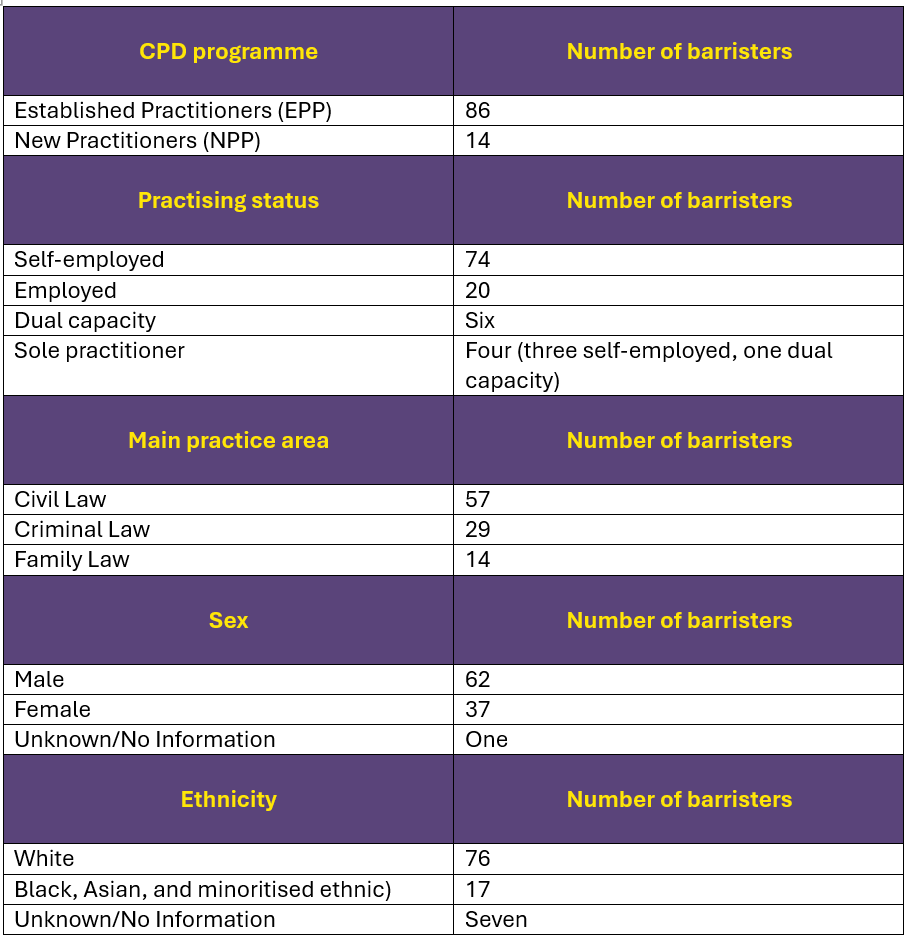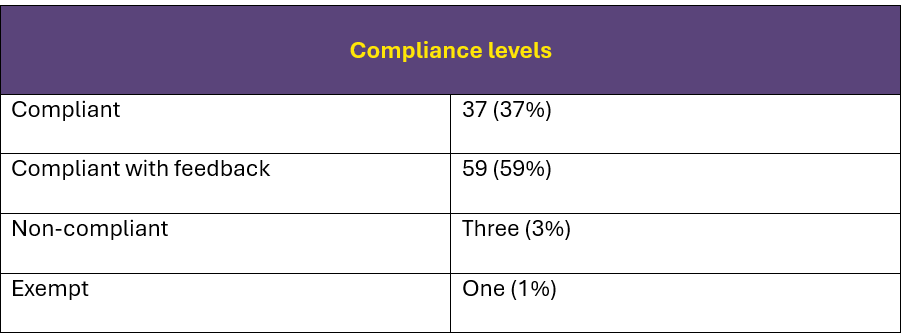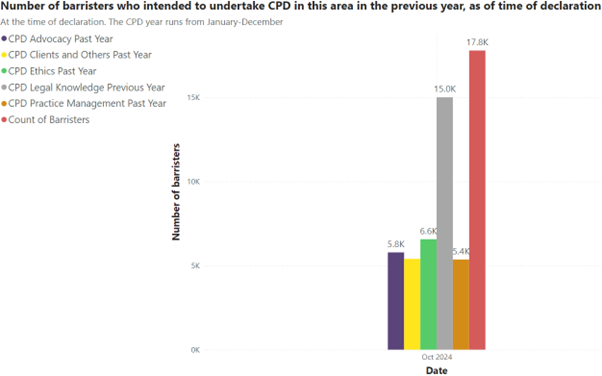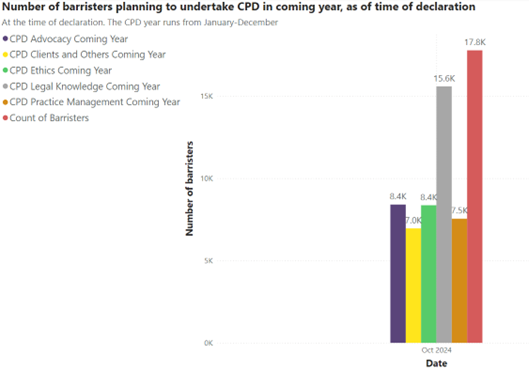We are committed to ensuring all barristers maintain and develop their professional competence.
Continuing Professional Development (CPD) is a critical part of this. Regularly updating their knowledge, skills, and attributes helps barristers provide the best possible service to their clients, keep up with changes in their practice areas, meet the high standards expected by the public and the profession, and ensure continuous improvement in the additional roles that they take on in their practice.
We conduct spot checks to monitor compliance with our CPD requirements and expectations in Part 4-C of the BSB Handbook and our CPD Guidance. These checks help ensure that barristers meet their obligations and that the profession maintains its reputation for excellence. They also allow us to identify good practices and areas where additional support or guidance may be needed to help barristers maintain or develop their professional competence and undertake effective CPD.
Barristers
We encourage barristers to use the information on this page to help meet our CPD requirements and expectations, reflect on and enhance their approach to CPD, and demonstrate good practice. For instance, by identifying and implementing ways to set more effective learning objectives and undertake meaningful reflection on their completed CPD activities.
Chambers and employers
We encourage barristers’ chambers and employers to use the information on this page to help reflect on and enhance their approach to professional development, play a proactive role in helping their barristers maintain and develop their professional competence, and demonstrate good practice. This is in the interests of their barristers and the wider profession, as well as their clients and the wider public.
This section summarises the CPD spot-check we completed in the Summer of 2024. It includes information about our approach, key findings for barristers and their chambers or employers to consider, the action we have already taken, and our next steps.
We trialled a more streamlined approach to CPD spot checks, which includes requiring barristers to upload their CPD records via MyBar and reducing the time allowed for submission.
We requested 100 barristers’ 2023 CPD records after they declared compliance with their CPD obligations in 2023 as part of our annual Authorisation to Practise process.
We used a random but representative sample to help reduce the risk of bias and reflect some of the key traits of the barrister profession:

We cannot draw statistically significant conclusions about compliance trends across the entire Bar or among specific groups of barristers from a sample of this size. However, it still gives us helpful information and highlights areas for improvement that all barristers can consider when planning and undertaking CPD.
Due to the sample size:
- We have not reported findings and trends by group, as this would be unreliable and potentially misleading.
- We grouped Black, Asian, and minoritised ethnic barristers when we created our sample.
- We did not consider characteristics other than sex and ethnicity because we have less data for those characteristics.
We could not see information about the ethnicity or sex of individual barristers in our sample during the assessment process or when writing this report. This data was only used to ensure a representative sample. However, we could see individual barristers’ names during the assessment process, for example, because they were displayed on their CPD records and MyBar accounts.

“Compliant” means a barrister has met their CPD obligations, and no changes or improvements are needed, although we encourage all barristers to continuously reflect on and improve their approach and demonstrate good practice
“Compliant with feedback” means a barrister has met their CPD obligations, but there are issues with their approach which they need to address, which may be serious enough to make them borderline non-compliant.
“Non-compliant” means a barrister has failed to meet one or more of their CPD obligations, for example, by failing to set any learning objectives or complete any reflection on their CPD activities if they are on the EPP.
When we compare these compliance levels to those from our last general CPD spot check in 2018:
- We assessed a greater proportion of the barristers whose CPD records we assessed in 2024 as compliant or compliant with feedback (96% in 2024 compared to 87% in 2018).
- We assessed a smaller proportion of the barristers whose CPD records we assessed in 2024 as non-compliant, including those who failed to cooperate with the spot-check process (3% in 2024 compared to 10% in 2018).
- We exempted the same proportion of the barristers from our 2024 and 2018 spot checks (1%).
These findings are positive. However, as stated, we cannot draw statistically significant conclusions about compliance trends from our 2024 sample.

We referred one non-compliant barrister for possible enforcement action. See the Reasons for non-compliance section of this page for more information.

We will conduct further compliance checks on 29 barristers in 2025 to ensure they address the issues we identified with their approach to CPD or our spot check. See the Reasons for further monitoring section of this page for more information.
In November 2024, we contacted the barristers who took part in our CPD spot check to inform them of our assessment of their compliance. In doing so, we:
- Signposted this webpage.
- Shared feedback with the barristers we assessed as compliant with feedback.
- Informed the barristers we assessed as non-compliant and explained what they must do to become compliant.
- Informed the barristers who will be subject to further monitoring in 2025 of the issues with their approach to CPD or cooperating with our spot check, when they can expect to hear from us, and the possible consequences if they do not address the issues we identified or cooperate with us.
- Invited those barristers who demonstrated good practice to collaborate with us, for example, to publish good practice case studies.
We assessed three barristers as non-compliant with the EPP because they did not complete any CPD in 2023 or provide a list of the CPD activities they completed. All barristers on the EPP must:
- Undertake CPD for any calendar year they practice, even if they return to practise part-way through the year or practise part-time (BSB Handbook rQ133).
- Keep a written record of their CPD plan and completed CPD activities for every calendar year they practice, which they must retain for three years (BSB Handbook rQ134).
We referred one of these barristers for possible enforcement action. Two will be subject to further monitoring in 2025.
Of the 29 barristers subject to further monitoring:
- 25 were assessed as compliant with feedback. However, their CPD records had issues, with some being borderline non-compliant. In the case of barristers on the EPP, this was usually due to issues with their learning objectives or minimal reflection on their CPD activities. In the case of barristers on the NPP, this was because they were unlikely to be able to complete all the requirements by their deadline.
- Two were assessed as compliant. However, they submitted their CPD records after the final deadline despite several requests, which they opened, and with no extenuating circumstances submitted. Barristers should not take long to locate and submit their CPD records from the previous CPD year, especially after declaring compliance with their CPD obligations in the last CPD year as part of our annual Authorisation to Practise process.
- Two were assessed as non-compliant with the EPP. Unlike the barrister we referred for possible enforcement action, these barristers attempted CPD. We have given them an opportunity to become compliant by the time of the future CPD spot check because their CPD records suggest their non-compliance was caused by a genuine mistake or misunderstanding. If they remain non-compliant when we subject them to further monitoring, we will refer them for possible enforcement action.
A significant portion—approximately one-third (34)—of the assessed CPD records lacked adequate reflection, making it the most common area for feedback. This means the records did not meet one or more of our expectations regarding reflection on completed CPD activities, which are set out in BSB Handbook Part 4-C and our CPD Guidance and Templates.
The importance of reflection
Reflection is a vital component of effective CPD. It involves using feedback and self-assessment to help barristers think critically about each CPD activity they completed, how it applies to or benefits their practice, and whether it helped them achieve the related learning objective(s).
By ensuring thorough and purposeful reflection, barristers can enhance the effectiveness of their CPD, reinforce professional standards, and ensure continuous improvement in their practice and the additional roles they take on.
Without adequate reflection, a barrister may not fully engage with the CPD process, potentially reducing the value of their professional development. This disengagement can impact individual competence levels, practices, client outcomes, and, ultimately, the reputation of the wider profession.
Highlighting the importance of reflection, barristers on the EPP must keep a written record of their reflection on the CPD activities they have completed, any variation in their planned CPD activities, and an assessment of their future learning objectives (BSB Handbook rQ134). We encourage barristers on the NPP to take these steps to help them get more out of their CPD, demonstrate good practice, and prepare for the EPP.
Support for effective reflection
Our CPD Resources, revised in January 2024, are designed to help barristers undertake meaningful, effective reflection as part of their CPD:
- Our CPD Guidance explains what reflection means and includes a list of questions barristers can ask themselves to help reflect on their CPD activities. It also includes examples of self-assessment and feedback that barristers can use to support their reflection.
- Our CPD Templates include a section on reflection, which has been completed in our CPD Examples.
Common issues with reflection:
Reflection was often found inadequate for the following reasons:
- Lack of detail. Some barristers’ reflection appeared to be completed as a tick-box exercise, possibly at the end of the CPD year or in response to a spot-check request, rather than throughout the year as each CPD activity was completed. For instance, some barristers noted that they believed their CPD activities met all learning objectives without further explanation or specific reflections on individual activities.
- Lack of connection to learning objectives. Some barristers reflected generally on their CPD activities rather than linking each activity and their reflections on it to specific learning objectives. As a result, their records often lacked an assessment of how each activity contributed to achieving its respective learning objectives.
A significant portion—almost one-third (31)—of the assessed CPD records lacked adequate learning objectives, making this the second most common area for feedback. This means the records did not meet one or more of our expectations regarding learning objectives, which are set out in BSB Handbook Part 4-C and our CPD Guidance and Templates.
The importance of learning objectives
Learning objectives help provide a structured approach to CPD by stating what barristers intend to achieve through their CPD activities (BSB Handbook rQ130). They ensure relevance to a barrister’s practice and facilitate measurable progress.
Without adequate learning objectives, CPD can lack relevance to a barrister’s practice, strengths and weaknesses, and professional goals. This can undermine their efforts to maintain and develop competence and continuously improve their practice.
Support for effective learning objectives
Our CPD Resources, revised in January 2024, are designed to help barristers set meaningful learning objectives:
- Our CPD Guidance explains what learning objectives are, provides a practical example of one, and helps barristers use feedback and self-assessment to identify learning objectives.
- Our CPD Templates include a section on learning objectives, which asks barristers to list each objective, select how they identified it, and select the area of competence it relates to based on the main areas of the Professional Statement.
Common issues with learning objectives
Learning objectives were often found inadequate for the following reasons:
- Not enough learning objectives. Some barristers only set one learning objective or two very similar learning objectives, even though they practised throughout 2023 on a full-time basis. This suggests minimal planning of CPD and engagement with the CPD process.
- Vague or incomplete learning objectives. Some barristers set vague learning objectives, which were not specific to their practice, strengths and weaknesses, or professional goals. For instance, to “keep my knowledge up to date” without specifying what aspect(s) of their knowledge, how they would keep it up to date, or what this would achieve.
- Limited scope. Some barristers only set learning objectives in one area of competence, which was usually legal knowledge. This is a crucial area of barristers’ competence. However, we encourage barristers to consider the range of knowledge, skills, and attributes they need to be competent, as set out in the Professional Statement, as well as their other roles, such as a head of chambers or pupil supervisor.
The limited scope of some barristers' learning objectives aligns with the evidence we gather during the annual Authorisation to Practise (AtP) process. Since 2024, we have required barristers to indicate which of the main areas of the Professional Statement they set learning objectives in for the current and previous CPD years. Almost 18,000 barristers answered these questions in AtP 2024. Their responses indicate that while most barristers set learning objectives in legal knowledge, a comparatively smaller proportion of barristers set objectives in other critical competence areas:


A relatively small number of barristers (10) used our new CPD Templates, which we launched in January 2024, even though our spot check was of their CPD records from 2023.
This may suggest they created their CPD records after we required them to participate in our spot check. However, it could also mean they migrated their CPD records to our new templates, for example, because they thought this would be helpful or that our new templates were compulsory.
Additionally, as noted in the Good practice section of this page, our new CPD Templates may be helping barristers demonstrate good practice.
Seven barristers demonstrated good practice. The main forms of good practice we identified were:
- Identifying learning objectives in various areas and not limiting themselves to one area, such as legal knowledge. For example, in addition to maintaining or updating their legal knowledge, some barristers identified learning objectives for practice management, working with clients and others, and engaging with vulnerable people, including those with specific vulnerabilities they encounter as part of their practice.
- Completing a range of CPD activities and not limiting themselves to self-directed study. For example, in addition to self-directed study, some barristers completed training courses, attended conferences, delivered training or lectures, and participated in mentoring or coaching.
- Demonstrating a tailored approach to CPD based on a clear understanding of the specific demands of their current or future practice, their strengths and weaknesses, their professional goals, the needs of the clients and communities they work with, good practice, and changes to law and procedure in their practice area(s).
- Demonstrating meaningful reflection on their CPD activities, considering the value of each activity, any benefits to their practice, progress towards their learning objectives, and ongoing or more advanced learning objectives.
In addition to the actions we have already taken, in the first half of the 2025 calendar year, we will:
- Continue to raise awareness of our findings and CPD Resources among barristers, their chambers and employers, and other key stakeholders, highlighting the importance of adequate learning objectives and reflection.
- Conduct a follow-up assessment of the compliance of the 29 barristers subject to further monitoring. This will be based on their 2024 CPD records.
- Initiate follow-up action if any of the 29 barristers subject to a follow-up assessment fail to demonstrate compliance or address the issues we identified.
- Agree on and start to communicate plans for our next CPD spot checks.

